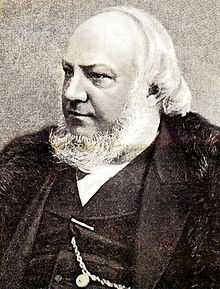Jacob Moleschott
Jacob Moleschott | |
|---|---|
 | |
| Born | 9 August 1822 |
| Died | 20 May 1893 (aged 70) |
| Nationality | Dutch |
| Alma mater | University of Heidelberg |
| Era | 19th century philosophy |
| Region | Western Philosophy |
| School | Continental materialism[1][2] |
Main interests | Philosophy of science, political philosophy |
Jacob Moleschott (9 August 1822 – 20 May 1893) was a Dutch physiologist and writer on dietetics. He is known for his philosophical views in regards to "scientific materialism".[2]
Life
Born in 's-Hertogenbosch, Moleschott studied at the University of Heidelberg and began the practice of medicine at Utrecht in 1845, but soon moved back to Heidelberg University, where he lectured on physiology from 1847. Controversial statements made by him in his lectures led to his resignation after seven years. Afterwards, he was professor of physiology at Zürich (1856), at Turin (1861), and at Rome (1879), where he died.
Writings
Moleschott explained the origin and condition of animals by the working of physical causes. His characteristic formulae were "no thought without phosphorus" and "the brain secretes thought as the liver secretes bile." His major works are:
- Physiologie der Nahrungsmittel (1850; second edition, 1859)
- Physiologie des Stoffwechsels in Pflanzen und Thieren (1851)
- Der Kreislauf des Lebens (1852; fifth edition, 1887)
- Untersuchungen zur Naturlehre des Menschen und der tiere (1856–93), continued after his death by Colosanti and Fubini
- Lehre der Nahrungsmittel (1858)
- Sulla vita umana (1861–67), a collection of essays
- Physiologisches Skizzenbuch (1861)
- Consigli e conforti nei tempi di colera (1864; third edition, 1884)
- Sull' influenza della luce mista e cromatica nell' esalazione di acido carbonico per l'organismo animale (1879), with Fubini
- Kleine Schriften (1880–87), collected essays and addresses
- Für meine Freunde (1894)
See also
Notes
- ^ The Nineteenth Century and After, Vol. 151, 1952, p. 227: "the Continental materialism of Moleschott and Buchner".
- ^ a b Jacob Moleschott and the conception of science in the 19th century scientific materialism as "totalizing" worldview by L. Meneghello
- ^ John Powell, Derek W. Blakeley, Tessa Powell (eds.), Biographical Dictionary of Literary Influences: The Nineteenth Century, 1800-1914, Greenwood Publishing Group, 2001, "Pavlov, Ivan Petrovich (1849–1936)."
References
- Fredrick Gregory: Scientific Materialism in Nineteenth Century Germany, Springer, Berlin u.a. 1977, ISBN 90-277-0760-X
External links
- Short biography and bibliography in the Virtual Laboratory of the Max Planck Institute for the History of Science
- The Popular Science Monthly, Volume 49 Sketch of Jacob Moleschott
- This article incorporates text from a publication now in the public domain: Gilman, D. C.; Peck, H. T.; Colby, F. M., eds. (1905). New International Encyclopedia (1st ed.). New York: Dodd, Mead.
{{cite encyclopedia}}: Missing or empty|title=(help)
